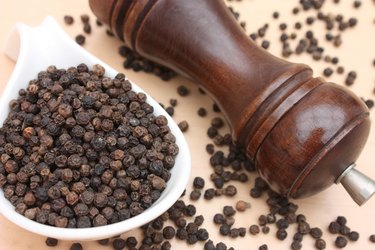
Black pepper is a spice rack staple, found in kitchen cabinets everywhere. And over the years, its near ubiquity has given rise to a plethora of claims, both pro and con, regarding its potential as either a medicinal treatment or a disease-causing irritant. But what does the science say?
Read more: Is Black Pepper Bad for You?
Video of the Day
Video of the Day
Black Pepper and Cancer Risk
One theory about the dangers of black pepper is that, when consumed over a long period of time, the spice may actually drive up the risk for developing stomach cancer or an ulcer. The problem, however, is that there's basically no reliable evidence on record to support this notion.
"Black pepper, and red pepper as well, have actually been studied with respect to the prevention and cause of stomach ulcers and stomach cancer," notes Connie Diekman, MEd, RD, a St. Louis-based food and nutrition consultant, formerly president of the Academy of Nutrition and Dietetics and a former director of university nutrition at Washington University in St. Louis.
"Animal studies do exist showing both outcomes," Diekman says. "But the studies associated with cancer generally are from consuming very large quantities of either pepper."
There are essentially no human studies, she cautions, that can confirm black pepper's association with cancer, one way or another.
Black Pepper and Drug Interactions
Highlighting another possible concern, a 2012 book titled Anesthesia and Uncommon Diseases, published by Elsevier, points out that black pepper might be problematic for those taking various prescription medications.
Specifically, the authors note that laboratory research suggests that the key ingredient in black pepper — piperine — may weaken an enzyme called CYP3A4, which helps the body properly metabolize certain medications.
That concern is also highlighted in a review of prior research published in the September 2018 issue of Pharmaceutics, which pointed to lab and animal research demonstrating that piperine inhibits CYP3A4 activity. The study also cautioned that piperine can double the potency of certain herbal compounds, such as the rhubarb extract emodin.
Although the findings have not been confirmed in humans, concerns raised by the book and study underscore the risk that black pepper may super-charge herbal compounds and a range of common prescription drugs, such as calcium channel blockers, chemotherapy drugs, fentanyl and antifungals.
What About Potential Benefits?
At the same time, claims have been lodged on behalf of black pepper's potentially positive impact on health.
For example, the Anesthesia and Uncommon Diseases book also notes that black pepper has been variously used to treat bronchitis, an upset stomach, skin irritation, neuralgia and cancer.
In addition, according to a research published in Critical Reviews in Food Science and Nutrition in June 2013, black pepper — which also goes by the scientific name Piper nigrum L. — is thought by some experts to have some antioxidant, anti-inflammatory and anti-microbial properties. The study also highlights other claims that black pepper might have potential as an inhibitor of tumor growth and as a means by which to improve gastrointestinal function.
But the study notes that, once again, all the evidence to back up these purported claims is rooted in animal research, which doesn't necessarily translate to human experience. The study notes that more research involving human participants is needed to confirm such potential benefits.
Use Black Pepper For Taste
Diekman suggests that it's probably best to approach all such claims about black pepper with caution. "Black pepper, like other plant foods, herbs and spices, does seem to possess some potential health benefits, at least in animals," she notes. Likewise, she adds that "like so many plant foods, black pepper seems to have antioxidant and anti-inflammatory benefits."
"But again, studies in humans are very limited," she cautions, "so it is unclear if pepper provides those health benefits to humans."
But Diekman does offer some practical and reasonably safe advice: "Black pepper can provide flavor to foods, making it easy to use less salt, which we know can trigger blood pressure issues in some people. So, if you enjoy black pepper, use it to enhance the dining experience, and maybe there will be a bonus of health benefits from the pepper."
- Connie Diekman, MEd, RD, food and nutrition consultant, St. Louis; former director, university nutrition, Washington University, St. Louis; former president, Academy of Nutrition and Dietetics
- Anesthesia and Uncommon Diseases (Sixth Edition): "Chapter 16: Mineral, Vitamin, and Herbal Supplements"
- Critical Reviews in Food Science and Nutrition: "Black Pepper and Health Claims: A Comprehensive Treatise"
- Pharmaceutics: “Beneficial Pharmacokinetic Drug Interactions: A Tool to Improve the Bioavailability of Poorly Permeable Drugs”
Is this an emergency? If you are experiencing serious medical symptoms, please see the National Library of Medicine’s list of signs you need emergency medical attention or call 911.